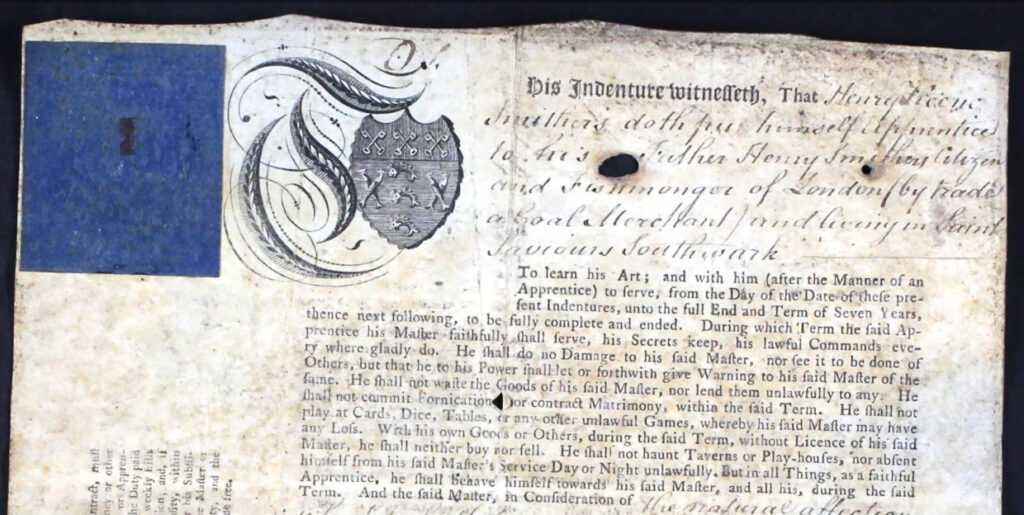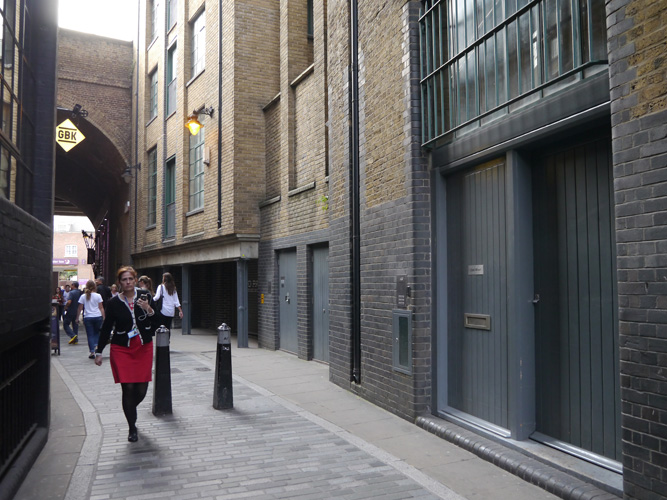In 1799, Henry Keene Smithers became an apprentice to his father, Henry Smithers, a London coal merchant and poet.1 It was not uncommon for teenage boys to become apprentices to their fathers, but given his father’s broad range of interests, his experience might have been somewhat unusual.
Henry Keene Smithers (1785-1859) was the eldest of the six children of Henry Smithers (1762-1828). (For clarity, I will refer to the son as Henry K., the father as Henry sr.) Born in London, Henry K. was 14 when he started his apprenticeship, slightly younger than the average age of 17.

Apprenticeship traditions dated from medieval times. The master was expected to house and feed the apprentice, teach him (or her) a marketable trade, and ensure that the apprentice followed the moral values of society. The apprentice had to learn various skills and obey the master. Many apprentices started by doing simple tasks, such as sweeping the floor, while observing the master conduct business. They gradually acquired the skills they needed over a seven-year period.
Henry sr. was an educated man. His own father and grandfather, both named Joseph Smithers, had been schoolmasters at St.Margaret Lothbury Academy in the City of London. Henry sr. believed that studying the arts and sciences promotes hard work, virtue and happiness, so it is easy to imagine that his son studied the classics along with accounting and the intricacies of the coal business.
In 1807, after Henry K. completed his apprenticeship, he was granted the Freedom of the City of London. In medieval times, a freeman had been someone who was not the property of a feudal lord but enjoyed privileges such as the right to earn money and own land. Many city dwellers were freemen, so this was the origin of the term ‘freedom of the City’. Freemen had various rights, including the right to carry on their trades, and the right to vote for Members of Parliament. In London especially, freedom also brought social prestige.
Completion of an apprenticeship was one way to achieve freedom of the city, but by the end of the eighteenth century, it was frequently purchased or inherited. In 1799, Henry sr. paid 46 shillings, eight pence to be admitted to the Freedom of the City of London.2 Henry K. was made free by patrimony; in other words, because he was his father’s legitimate son.3
Henry sr. was also a member of a trade guild, the Company of Fishmongers, and so was his son. Guilds and livery companies were another medieval invention. They were created so their members could provide each other with support and enforce standards in craftsmanship and in retail trade. The guilds also oversaw apprenticeships, ensuring that masters met their obligations and that apprentices achieved competence.
There was a lot to learn about the coal trade. Coal was shipped from the north of England, where it was mined, down the coast to London, where people used it to heat their homes and to power expanding industries. Some 1.2 million tons of coal were imported to London in 1800. But the merchants had to deal with hundreds of regulations and pay expensive duties to the government. So many people complained about the high cost of coal in London and suspected there were irregularities in the system that Parliament held an enquiry into these issues.

An 1803 London city directory shows that Keen and Smithers, coal merchants, had an office on Clink Street in Southwark, not far from the London Bridge on the south shore of the Thames. The Smithers family had lived in Southwark in 1799, but by 1807 Henry sr. must have achieved considerable financial success because he now lived at an exclusive address: the Adelphi, a development of 24 terraced houses, built in the 1770s overlooking the Thames River, near today’s Victoria Embankment Gardens in central London.
Perhaps the coal business became too challenging, however, because in 1812 and 1813, the names of Henry Keene Smithers, Henry Smithers and another partner appeared in the bankruptcy announcements of several English newspapers.
Henry sr. appears to have retired soon after that, perhaps to travel and concentrate on his writing. He published several books in the following years, ranging from an account of his travels in Europe to a book about Liverpool and the cotton trade.
At some point, Henry K. also left the coal business. In the 1841 census, he identified himself as an accountant and in 1851, he said he was a general merchant and agent.
Research Remarks
While in London in September 2014, I visited the Museum of London Docklands, where I found several panels about the coal trade.
Stuart A. Raymond’s My Ancestor was an Apprentice; How Can I Find Out More About Him? London: Society of Genealogists Enterprises Ltd, 2010 provides background on apprenticeships and freedom of the city and guides the researcher looking for further information.
The database London, England, Freedom of the City Admission Papers, 1681-1925 provides a wealth of information. These documents give an indication of family relationships, apprenticeships, guild membership, residence and occupation, as well as admission to the freedom of the city.
In 1818, Henry sr. wrote, “I maintain that the cultivation of the Arts and Sciences are Favourable to virtue and to happiness. I. The cultivation of the Arts and Sciences naturally promote Industry. II. Habits of Industry are favourable to Virtue and Piety. III. The practice of Virtue and Piety ensures to man the greatest portion of happiness, taking into consideration his relation to the present and to a future state of existence.” Smithers, Henry.
The Cultivation of the Arts and Sciences. Brussels, Printed at the British Press, 1818, p. 10.
http://babel.hathitrust.org/cgi/pt?id=loc.ark:/13960/t8ff52w97;view=1up;seq=10
The books of Henry Smithers are available online or in reprint editions. He wrote both poetry and non-fiction, but his best known book is probably Affection; with Other Poems, by Henry Smithers of the Adelphi, London.London: Printed for the Author by T. Bensley and Sold by W. Miller, 1807. http://babel.hathitrust.org/cgi/pt?id=uc2.ark:/13960/t5cc0z71k;view=1up;seq=1
photo credits: above, Ancestry.com; below, Janice Hamilton
Footnotes
- “London Metropolitan Archive; Reference Number: COL/CHD/FR/02/1315-1321,” database, Ancestry.com (http://www.ancestry.com: accessed 3 December 2014), entry for Henry Keene Smithers, 5 December 1799; citing London, England, Freedom of the City Admission Papers, 1681-1925.
- “London Metropolitan Archive; Reference Number: COL/CHD/FR/02/1229-1265,” database, Ancestry.com (http://www.ancestry.com: accessed 3 December 2014), entry for Henry Smithers, 8 October 1799, citing London, England, Freedom of the City Admission Papers, 1681-1925.
- “London Metropolitan Archive; Reference Number: COL/CHD/FR/02/1655-1660,”database, Ancestry.com (http://www.ancestry.com: accessed 3 December 2014), entry for Henry Keene Smithers, born 1812, 3 June 1807, citing London, England, Freedom of the City Admission Papers, 1681-1925.
